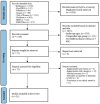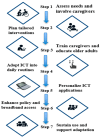Effectiveness, Adoption Determinants, and Implementation Challenges of ICT-Based Cognitive Support for Older Adults with MCI and Dementia: A PRISMA-Compliant Systematic Review and Meta-Analysis (2015-2025)
- PMID: 40565449
- PMCID: PMC12193062
- DOI: 10.3390/healthcare13121421
Effectiveness, Adoption Determinants, and Implementation Challenges of ICT-Based Cognitive Support for Older Adults with MCI and Dementia: A PRISMA-Compliant Systematic Review and Meta-Analysis (2015-2025)
Abstract
Background: The increasing prevalence of dementia and mild cognitive impairment (MCI) among the elderly population is a global health issue. Information and Communication Technology (ICT)-based interventions hold promises for maintaining cognition, but their viability is affected by several challenges. Objectives: This study aimed to significantly assess the effectiveness of ICT-based cognitive and memory aid technology for individuals with MCI or dementia, identify adoption drivers, and develop an implementation model to inform practice. Methods: A PRISMA-based systematic literature review, with the protocol registered in PROSPERO (CRD420251051515), was conducted using seven electronic databases published between January 2015 and January 2025 following the PECOS framework. Random effects models were used for meta-analysis, and risk of bias was assessed using the Joanna Briggs Institute (JBI) Critical Appraisal Checklists. Results: A total of ten forms of ICT interventions that had proved effective to support older adults with MCI and dementia. Barriers to adoption included digital literacy differences, usability issues, privacy concerns, and the lack of caregiver support. Facilitators were individualized design, caregiver involvement, and culturally appropriate implementation. ICT-based interventions showed moderate improvements in cognitive outcomes (pooled Cohen's d = 0.49, 95% CI: 0.14-1.03). A sensitivity analysis excluding high-risk studies yielded a comparable effect size (Cohen's d = 0.50), indicating robust findings. However, trim-and-fill analysis suggested a slightly reduced corrected effect (Cohen's d = 0.39, 95% CI: 0.28-0.49), reflecting potential small-study bias. Heterogeneity was moderate (I2 = 46%) and increased to 55% after excluding high-risk studies. Subgroup analysis showed that tablet-based interventions tended to produce higher effect sizes. Conclusions: ICT-based interventions considerably enhance cognition status, autonomy, and social interaction in older adults with MCI and dementia. To ensure long-term scalability, future initiatives must prioritize user-centered design, caregiver education, equitable access to technology, accessible infrastructure and supportive policy frameworks.
Keywords: ICT; assistive technology; cognitive support; dementia; digital health; digital literacy; healthcare technology; mild cognitive impairment; technology adoption.
Conflict of interest statement
The authors declare no conflicts of interest.
Figures













References
-
- Long S., Benoist C., Weidner W. World Alzheimer Report 2023: Reducing Dementia Risk: Never Too Early, Never Too Late. Alzheimer’s Disease International; London, UK: 2023. [(accessed on 4 May 2025)]. Available online: https://www.alzint.org/u/World-Alzheimer-Report-2023.pdf.
-
- Evans-Lacko S., Aguzzoli E., Read S., Comas-Herrera A., Farina N. World Alzheimer Report 2024: Global Changes in Attitudes to Dementia. Alzheimer’s Disease International; London, UK: 2024. [(accessed on 4 May 2025)]. Available online: https://www.alzint.org/resource/world-alzheimer-report-2024/
-
- Rapaport P., Burton A., Leverton M., Herat-Gunaratne R., Beresford-Dent J., Lord K., Downs M., Boex S., Horsley R., Giebel C., et al. “I just keep thinking that I don’t want to rely on people.” a qualitative study of how people living with dementia achieve and maintain independence at home: Stakeholder perspectives. BMC Geriatr. 2020;20:5. doi: 10.1186/s12877-019-1406-6. - DOI - PMC - PubMed
-
- Lee M., Mishra R.K., Momin A., El-Refaei N., Bagheri A.B., York M.K., Kunik M.E., Derhammer M., Fatehi B., Lim J., et al. Smart-home concept for remote monitoring of instrumental activities of daily living (IADL) in older adults with cognitive impairment: A proof of concept and feasibility study. Sensors. 2022;22:6745. doi: 10.3390/s22186745. - DOI - PMC - PubMed
Publication types
LinkOut - more resources
Full Text Sources

